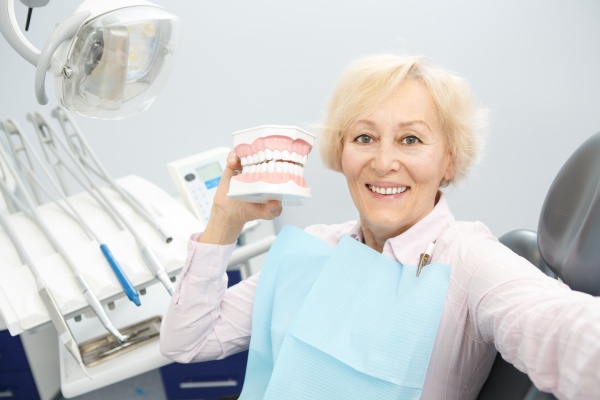Eating With Partial Dentures and What to Avoid

Partial dentures are used to replace missing teeth when you still have most of your natural teeth. Even though the dentures help restore your smile, they can take time to get used to, especially when it comes to eating.
Eating with partial dentures and what to avoid
Exercise patience
Eating with partial dentures is not the same as eating with your natural teeth, which means there will be an adjustment period before you are comfortable. Even though it might be frustrating at first, you have to exercise patience.
Chewing with your natural teeth is easier because the nerves in your teeth transmit signals to your brain, telling it how hard or soft to chew the food in your mouth. If you have partial dentures, the artificial teeth do not have a connection to your brain, which will make chewing difficult at first.
Start out with soft foods like eggs, vegetables, fish and cereal before moving up to meats and harder foods. You should also make sure you cut your food into small bite-size pieces to make chewing easier.
Avoid using your front teeth
If your partial dentures are in the front of your mouth, biting down on food will be difficult and can damage your dentures. Instead of biting down on something like an apple with your front teeth, you should cut it into smaller pieces with a knife, making it easier to chew the food while limiting any damage to your dentures.
Stay away from certain foods
When you have partial dentures, there are specific foods you should avoid to prevent damage to your dentures. These include:
- Peanuts/peanut butter: Like all sticky foods, peanut butter should be avoided at all costs because of the damage it does to dentures
- Steak: If you are a meat lover, this will be a tough one to give up, but it is one of the sacrifices you have to make if you have dentures, because chewing tough meats can put a great deal of pressure on your dentures and the gums underneath, leaving you in pain
- Hard candy: Biting down on hard candy can cause serious damage to your dentures, costing you money in the process; this does not mean you cannot enjoy candy, it just means that if you must have hard candy, you need to suck on it instead of biting down on it with your dentures
- Popcorn: Popcorn kernels get lodged in your teeth, are a hassle to get out and can cause damage to your partial dentures, especially if you accidentally bite an unpopped kernel
Brush your dentures regularly
Having dentures does not mean you stop practicing good oral hygiene. Make sure to brush and clean your partial dentures regularly to avoid the inflammation of your gums and the decay of your remaining natural teeth.
Conclusion
Eating with partial dentures will take a little getting used to, but if you follow the steps provided, you should be able to enjoy most of the food you used to eat before you got the dentures. Ask your dentist for tips on how to eat without damaging your dentures.
Request an appointment here: https://www.drkhorsand.com or call Khorsand Dental Group at (760) 394-3082 for an appointment in our El Centro office.
Check out what others are saying about our services on Yelp: Read our Yelp reviews.
Related Posts
A kid friendly dentist can do much more than performing a routine examination on your child’s teeth and gum. The dentist also provides important restorative care when your son or daughter has a large cavity. Tooth decay can be common among young patients. When this occurs, the child is at risk of losing the tooth.…
The joint holding the jaw to the skull is called the temporomandibular joint, or TMJ. It is a complex system of bones, muscles, and tendons that must work in sync to ensure the jaw can move and function properly. When one of the components has a problem, it may turn into a TMJ disorder that…
A dental crown has many uses in same day dentistry. Its basic function is to protect the structure of the tooth and keep it healthy. Unlike traditional dental crowns that require at least two appointments, same day dental crowns allow you to get a new smile in one dental appointment. Continue reading to discover some…
Clear braces are becoming more common among patients of all ages. In past years, orthodontists chose traditional metal braces to straighten crooked teeth. However, there are advantages to using clear options instead. If you do not want your orthodontic treatment to hinder your smile, you should not have to worry. Repair your teeth without anyone…
